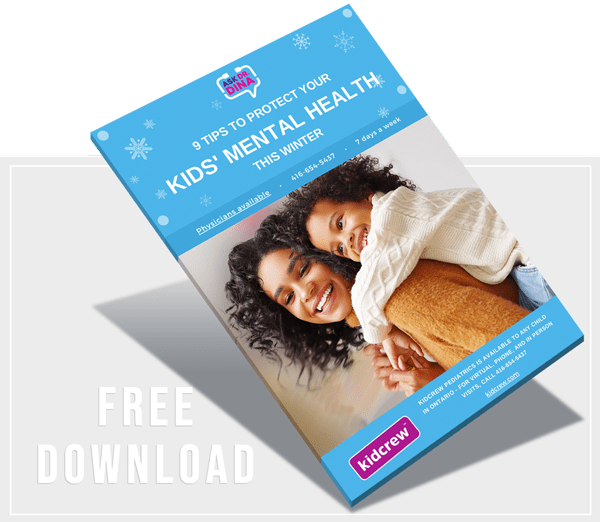Most parents are not attuned to their child’s mental health.
Most parents are attuned to their child’s physical health.
We bring our kids to the doctor for well-child visits, and vaccines, and when they are sick or injured.
However, many parents are not as attuned to their children’s mental health though and may miss mental health issues in their kids.
Did you know that 1 in 5 children experience signs of mental illness each year?
That is a lot of children!
While it is a common concern for young people, it is important to know that, just as with physical illness and injuries, early identification and intervention can make a big difference for your child.
What to do to support your children’s mental health
1. Take care of your own mental health
Your children watch everything you do. And the way you interact with the world. They see how you fill your own proverbial bucket, and how you fill others’. They see when you are happy and how you enable this, and when you are sad, and how you react to these feelings. They are sponges.
One of the key ways that children learn is through modelling. They see what you do, and what you don’t do. One of the best ways to support your children’s mental health, is to support your own mental health.
Kids learn by watching you. If you take time for you, doing things that make you feel happy and fulfilled, they will see they can do the same.
Try to remember to set a positive example when dealing with anxiety-inducing and stressful situations.
Do you react with anger or sadness or frustration?
Do you pause and act calmly and mindfully?
We all get frustrated and irritated sometimes.
This is normal and important for your children to see as well. But how we rise to the occasion is also important.
If you are struggling with mental health concerns yourself, it is best to discuss these concerns with your health care provider as well.
If you are getting help to make sure you feel your best, that is a very valuable lesson for your child as well!
2. Show them how to fill their bucket
Many parents put everything into their kids and their family.
Some parents lose their own sense of self or forget what brings them joy and happiness.
Just as we discussed above, if we want our kids to love themselves, and stay healthy physically and mentally, we need to give them the skills to do this.
This starts with you!
How do you relief your stress?
Do you exercise?
Go for a walk?
Call up a friend or family member?
How do you fill your bucket? Ensure you lead your healthiest life possible, so your child will model that, AND see that it is acceptable and they are encouraged to do the same.
Establishing healthy habits early on will go a long way.
Demonstrate healthy habits such as getting a good night’s sleep, eating healthfully and mindfully and getting heart racing activity every day.
Practice what you preach!
3. Build trust
Children want to feel safe and secure.
A relationship between child and parent starts with trust.
Babies trust we will feed them and clean them and provide comfort. An older child continues to want the same feeling of safety and security. Even as they age, we continue to take care of their physical and also their emotional needs. We comfort them when they are sad, angry, anxious and scared.
We can build trust by being consistent and honest and kind and loving.
We are their rock, and also their shoulder to cry on.
Download this free resource – 9 Tips To Help Protect Your Kids’ Mental Health
4. Be consistent
Children crave predictability and consistency.
They like routine and value knowing what to anticipate and when.
Some parents see this as being strict or inflexible, but children want to know what privileges they will gain for positive behavior and what consequences may come from negative behavior. Learning these rules of life is necessary as they grow up and become independent adults.
Maintaining consistent and predictable discipline will help children learn boundaries and set appropriate expectations for their behavior.
5. Demonstrate healthy relationships
Children watch and learn from the relationships around them.
Perhaps your child watches the relationship you have with your partner, or your own parent, or a sibling.
Are these relationships healthy?
Is your child watching other adults being respectful, kind and supportive of one another?
Ensure your child has the opportunity to watch healthy relationships around them, and encourage your child to engage in healthy relationships, such as with friends or other family members. Practice makes perfect, and the more they engage with others who love and support them, the more they can model this behavior in future relationships.
6. Have fun together!
During our busy days, it can be challenging to find time to let loose and have fun.
But our kids want to play, and we adults can use more fun!
Try to carve out some time to be silly together.
Put away the chores and work and focus on only your child.
Even for 15 min.
Eyes to eyes.
No screens or distractions.
Just you and your child.
Get down on the floor or to their eye level. And look at your child.
They are incredible!
A few minutes of play will increase happiness and connection and will protect against depression and anxiety. It is a huge stress reliever and will strengthen your bond and connection with your child. Laughter is the best medicine, right?
In conclusion, please be vigilant and don’t hesitate
If you have concerns about your child’s mental health, please be sure to discuss them with your health care provider.
Mental health resources are available.
Signs of mental illness include emotional lability, less enjoyment in activities, difficulty with eating and sleeping, excessive crying or irritability and trouble concentrating.
If your child has ongoing mental health issues such as anxiety, or behavioral difficulties, and you are worried about their mental health, it is best to have your provider do a formal assessment and ensure mental health care.
Remember, early identification and intervention is key!
XO

Dr. Dina Kulik
Dina is a wife, mother of 4, and adrenaline junky. She loves to share children’s health information from her professional and personal experience. More About Dr Dina.












